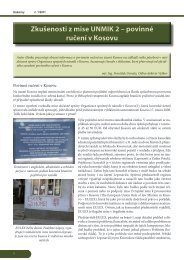TRADOC Pam 525-3-7-01 - TRADOC - U.S. Army
TRADOC Pam 525-3-7-01 - TRADOC - U.S. Army
TRADOC Pam 525-3-7-01 - TRADOC - U.S. Army
- No tags were found...
You also want an ePaper? Increase the reach of your titles
YUMPU automatically turns print PDFs into web optimized ePapers that Google loves.
<strong>TRADOC</strong> <strong>Pam</strong> <strong>525</strong>-3-7-<strong>01</strong>The moral development of Soldiers is a complex subject. The rules of engagement carefullyestablished for every operation still cannot foresee all the situations that Soldiers and their leaderswill face. The moral dilemma’s faced by Soldiers in future full spectrum operations are likethose Soldiers have always faced in battle; morally ambiguous situations where there appears tobe no clear solution. In order for the <strong>Army</strong> to be a moral organization, it is essential for Soldiersto understand the moral reasoning process, moral recognition, moral judgment, moral intent, andmoral behavior. More than understanding, Soldiers must repetitively exercise their moraljudgment while making decisions and taking actions consistent with professional military values.To navigate through this process with confidence and courage requires developing early andcontinuously in Soldiers the three key capabilities of dealing with moral complexity, acceptingmoral agency and achieving moral efficacy. This triad of capabilities is the foundation of moraldevelopment.The <strong>Army</strong> must provide for the strong ethical grounding of its members and particularly itsleaders. A check-the-block program of annual briefings, or en mass generic character guidancesessions, is not adequate. Every transformational experience or “trigger point” in individualdevelopment must have ethical content integrated to insure attachment of its proper meaning(understanding) and internalization of principals by the subject. 85 In line units, ethical leadershipis a chain of command function. Institutionally, at every level of formal individual development,units must allocate time and resources in proportion to the institutional costs of individual andcollective ethical failure. Though in ethical terms such failures have always borne their costs, inthis period of instant global visibility ethical lapses can have extraordinary strategic costs tomission accomplishment and America’s reputation.3-4. Developing Socio-cultural AwarenessIn 1969, British historian, Sir Michael Howard, pointed out that modern armed conflicts (postWorld War II) were “not simply military conflicts with a complex political background; they arerather political conflicts which involve an unusually high level of violence” 86 Howard wroteprincipally of post-colonial wars, where developed industrial powers (including the U.S. andSoviet Union) sought either to extend collapsing colonial mandates or influence the character ofsuccessor governments as they, an ally, or a rival power, withdrew.Today’s “Wars amongst the peoples,” 87 as General Sir Rupert Smith has characterizedinterventions into areas lacking effective civil powers, share with the conflicts Howardcharacterized the fundamental fact that foreign military forces employ for political purposes. Inthe case of post-modern conflicts, those political purposes often have the aim of producingsufficient local public stability and support to permit building or rebuilding a reasonablyresponsible civil society. This can require operations against other dedicated foreign fighterswho claim to share common values with the host society, hostile factions within the host societycontending for power within the wider emerging or declining political structure, or a shiftingcombination of both. After Vietnam, the U.S. and the <strong>Army</strong> avoided accepting nation building asa core mission. American military culture and <strong>Army</strong> mantra and doctrinal preference goes toclosing with and destroying the enemy in decisive battle. However, most conflicts since 1945have been at the lower end of the spectrum. These kinds of interventions will likely continue todominate military activities in future full spectrum operations.71



